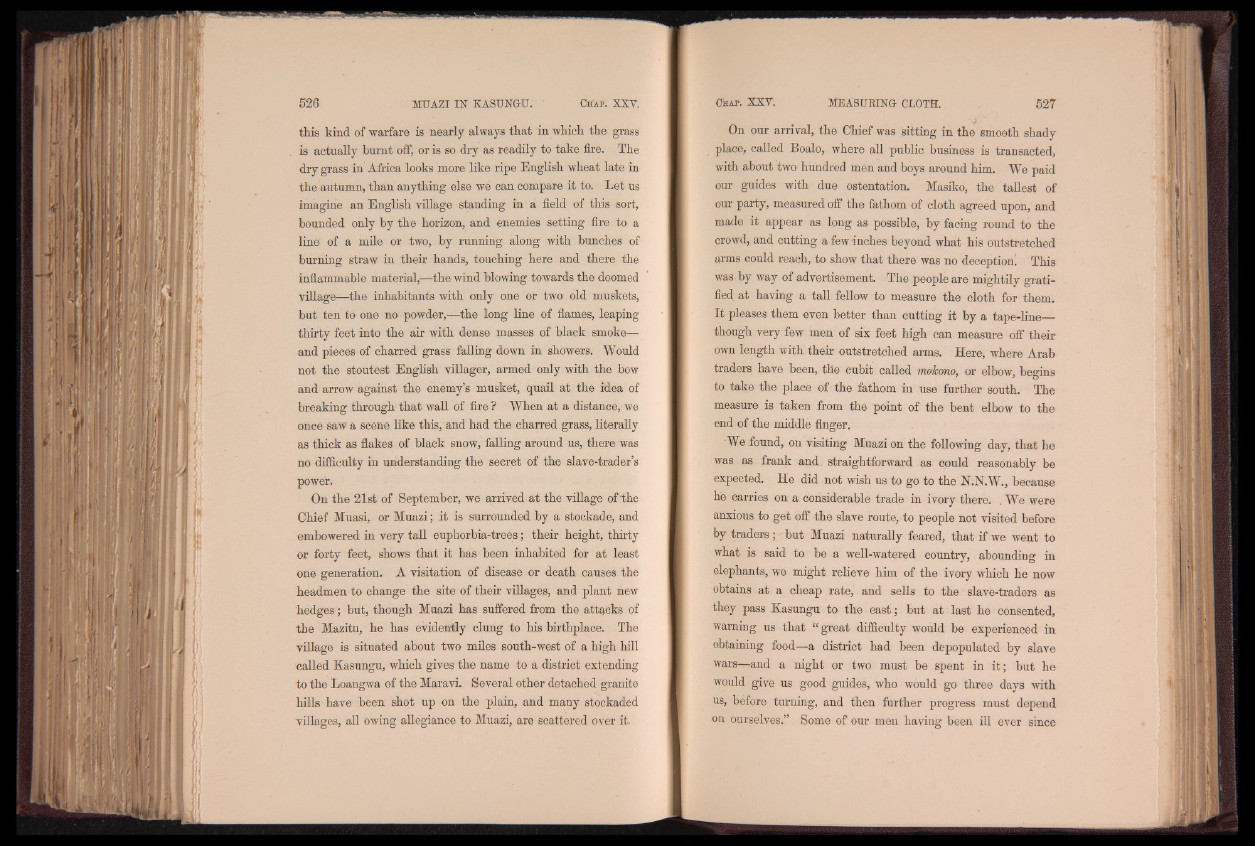
this kind of warfare is nearly always that in which the grass
is actually burnt off, or is so dry as readily to take fire. The
dry grass in Africa looks more like ripe English wheat late in
the autumn, than anything else we can compare it to. Let us
imagine an English village standing in a field of this sort,
bounded only by the horizon, and enemies setting fire to a
line of a mile or two, by running along with bunches of
burning straw in their hands, touching here and there the
inflammable material,—the wind blowing towards the doomed
village—the inhabitants with only one or two old muskets,
but ten to one no powder,—the long line of flames, leaping
thirty feet into the air with dense masses of black smoke—
and pieces of charred grass falling down in showers. Would
not the stoutest English villager, armed only with the bow
and arrow against the enemy’s musket, quail at the idea of
breaking through that wall of fire ? When at a distance, we
once saw a scene like this, and had the charred grass, literally
as thick as flakes of black snow, falling around us, there was
no difficulty in understanding the secret of the slave-trader’s
power.
On the 21st of September, we arrived at the village of "the
Chief Muasi, or Muazi; it is surrounded by a stockade, and
embowered in very tall euphorbia-trees; their height, thirty
or forty feet, shows that it has been inhabited for at least
one generation. A visitation of disease or death causes the
headmen to change the site of their villages, and plant new
hedges; but, though Muazi has suffered from the attacks of
the Mazitu, he has evidently clung to his birthplace. The
village is situated about two miles south-west of a high hill
called Kasungu, which gives the name to a district extending
to the Loangwa of the Maravi. Several other detached granite
hills have been shot up on the plain, and many stockaded
villages, all owing allegiance to Muazi, are scattered over it.
On our arrival, the Chief was sitting in the smooth shady
place, called Boalo, where all public business is transacted,
with about two hundred men and boys around him. We paid
our guides with due ostentation. Masiko, the tallest of
our party, measured off the fathom of cloth agreed upon, and
made it appear as long as possible, by facing round to the
crowd, and cutting a few inches beyond what his outstretched
arms could reach, to show that there was no deception! This
was by way of advertisement. The people are mightily gratified
at having a tall fellow to measure the cloth for them.
It pleases them even better than cutting it by a tape-line—
though very few men of six feet high can measure off their
own length with their outstretched arms. Here, where Arab
traders have been, the cubit called mokono, or elbow, begins
to take the place of the fathom in use further south. The
measure is taken from the point of the bent elbow to the
end of the middle finger.
We found, on visiting Muazi on the following day, that he
was as frank and. straightforward as could reasonably be
expected. He did not wish us to go to the N.N.W., because
he carries on a considerable trade in ivory there. . We were
anxious to get off the slave route, to people not visited before
by traders ; - but Muazi naturally feared, that if we went to
what is said to be a well-watered country, abounding in
elephants, we might relieve him of the ivory which he now
obtains at a cheap rate, and sells to the slave-traders as
they pass Kasungu to the east; but at last he consented,
warning us that “ great difficulty would be experienced in
obtaining food—a district had been depopulated by slave
wars—and a night or two must be spent in it; but he
would give us good guides, who would go three days with
us, before turning, and then further progress must depend
on ourselves.” Some of our men having been ill ever since